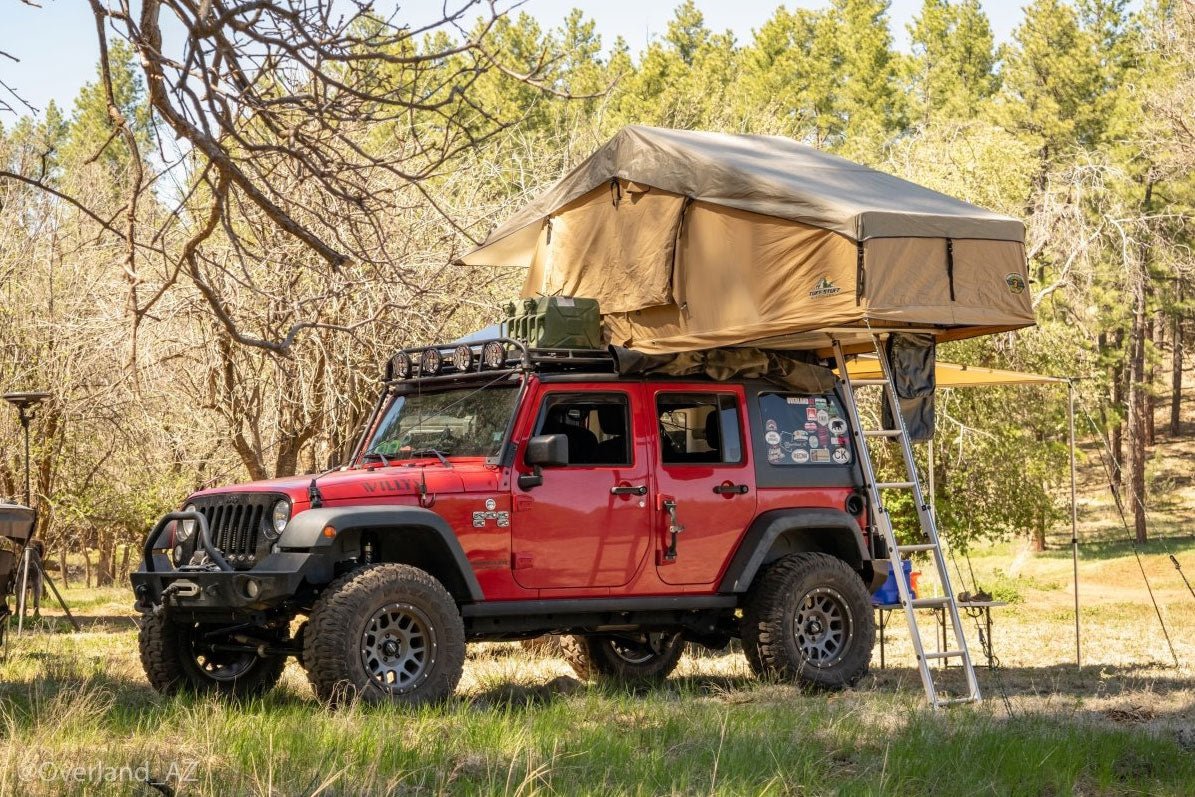Investing in a rooftop tent is possibly one of the best decisions you can make as a camper. With a tent that offers comfort and convenience on the go, you can enjoy a more quality camping trip alone or with friends and family.
Although rooftop tents are the new rave with campers everywhere purchasing a rooftop tent in various brands and models, many people are still skeptical and harbor concerns regarding these lofty nests that are popped up on vehicles.
One of these many concerns is the big question of how much weight a rooftop tent can hold without risking their safety and that of their vehicles. In this article, we have provided all you need to know about a rooftop’s weight load capacity and how to ensure your safety.

Hopping On The Rooftop Tent Train
Rooftop tents are tents erected on the roof of a camping truck or van. Like regular tents, they come in different models, colors, sizes, and at different prices.
Although rooftop tents are a different ball game from conventional ground tents, they have slowly but surely been introduced to the camping scene and are being recognized as an essential camping gear. These outdoor living structures have peaked in popularity these past few years due to the benefits they offered adventurous campers.
Seeing the immense benefits of owning a rooftop tent, it is easy to see why they have become an overnight phenomenon. Although they have their pros and cons, the benefits outweigh the concerns and the concerns are not much of a concern if you already know what you are getting into.
Some rooftop tent pros include:
Ease of Mobility
If you are a frequent camper or an overland camper then you will enjoy the ease and freedom rooftop tents offer. Being constantly on the go means you have to set up camp at a location, usually not for long.
Conventional tents may sound like an excellent option but that means you have to set up a tent in the evening only to tear it down in the morning. This repetitive ritual can be frustrating, tiring, time-consuming, and seem like too much work for a few hours worth of sleep.
With rooftop tents that pop up in a matter of minutes, you can be anywhere you want and at any time. Since your tent is latched to the roof of your vehicle, you can pack up and go any time you want.
Easy Set-Up
This benefit cannot be over-emphasized. Conventional tents require time and effort to be erected. This requires inserting tent poles and making knots to erect your temporary sleeping space. With a rooftop tent, you do not have to worry about any of these.
After the initial installation, you can pop up your tent and set it up with your mattress, pillows, and blankets in less than five minutes. The take-down is just as easy and since most tents come with a tent cover to store your tent on the roof of your car, you do not have to be worried about taking the entire tent apart.
Additionally, some rooftop tent brands allow campers to store their sleeping gear in the tent when it is closed down. With your sleeping space already set up, you can easily set up camp without the fuss that comes with using conventional camping tents.
Camp Anywhere
Using a conventional tent means you cannot camp on rocky, muddy terrain. It also means you will have to find a suitable designated or dispersed camping area where you can set up camp safely.
With a rooftop tent, you can camp anywhere as long as you can find a great spot to park. No designated campsite to set up camp? You can pull off the road and pop up your rooftop tent.
Flat Sleeping Surface
When you want to set up your ground tent, you have to clear the area of pebbles, rocks, and sticks. Even after this- unless you invest in an air mattress- you can still fill stones and debris poking you.
In some conditions, you can pitch your tent on uneven ground that contributes to an uncomfortable night rest. Rooftop tents have steady and in-built fiberglass or aluminum floor bases that provide an even flat surface for you to sleep.
Better View
Investing in a rooftop tent is possibly one of the best decisions you can make as a camper. With a tent that offers comfort and convenience on the go, you can enjoy a more quality camping trip alone or with friends and family.
Although rooftop tents are the new rave with campers everywhere purchasing a rooftop tent in various brands and models, many people are still skeptical and harbor concerns regarding these lofty nests that are popped up on vehicles.
One of these many concerns is the big question of how much weight a rooftop tent can hold without risking their safety and that of their vehicles. In this article, we have provided all you need to know about a rooftop’s weight load capacity and how to ensure your safety.
Cheaper Than RVs
Do you want more luxury on your camping trip but cannot afford the thousands of dollars necessary to purchase a RV? Get a rooftop tent instead! Admittedly, rooftop tents lack in-door toilet and kitchen systems present in many Rv models, rooftop tents are still an excellent upgrade from conventional camping tents.
You get to experience more convenience and comfort than you will if you see ground tents. Additionally, some rooftop tents provide extra features that allow the attachment of separately-bought annexes, awnings, and awning shade walls. With this option, and many other rooftop tent accessories, you can customize your rooftop tent however you like.
Safety
Safety is always a concern whenever you go camping. From the fear of wildlife and critters to that of being caught in a storm. With rooftop tents, you are at a higher vantage point that protects you from wildlife like crocodiles, wolves, and bears.
Getting off the ground also means you don’t experience crawling critters like snakes. You do not also have to be stuck in a pool of muddy water when it rains because you will be safely tucked in a durable cocoon on the roof of your car.
Some cons of using rooftop tents include:
- More expensive: although the advantages of rooftop tents are undeniable, the price, for many campers, is a deal-breaker. Rooftop tents are more expensive than conventional tents and can cost anywhere from $1000 to $4000. If you need to purchase more accessories, you will have to spend even more money.
- The climb: the whole point of getting a rooftop tent is to get off the ground, but for many people, this is a problem. Understandably,it can be very frustrating to have to climb down and back up every time you need to take a leak. Also, getting your pets up and into the tent may be a fuss. However, if this doesn't bother you, you should go ahead and get a tent.
However, before you go in search of a rooftop tent for your subsequequent camping trip, you need to ensure you have complete knowledge of what it takes to own a rooftop tent. The more knowledgeable you are, the more you can optimize your rooftop tent on your outdoor expenditure.
How Much Weight Can A Rooftop Tent Hold?
You have made the decision to buy a rooftop tent for your next camping expenditure but you just can’t seem to shake the nagging concern of if a rooftop tent is strong enough to hold your weight.
Admittedly, a rooftop tent looks like a regular tent. However, rooftop tents are designed with a sturdy structure to ensure they can bear enough weight without harming occupants on the vehicle they are latched on.
So, how much weight can a rooftop tent comfortably hold?
It is important to note that there are different types of tent and there is no formular to determine how much weight a rooftop tent can hold. Regardless, some manufacturers make it a point to clearly note a rooftop tent’s weight limit in the manual or instructional guide.
That being said, a tent’s weight limit depends on the typeof tent it is, the number of occupants it is meant for, and the materials it is made from.
A rooftop tent has a maximum weight capacity that ranges from 800 to 1000 lbs depending on these factors and the manufacturer. On average, a rooftop tent has an average weight capacity of 900lbs.
Some manufacturers roughly place the weight of a camper at the 200 pound mark. With this, you can be sure that a two-person rooftop tent will comfortably support a minimum of 400lbs. Generally, the average weight capacity of a rooftop tent is 900lbs.
If a rooftop tent is made with durable aluminum flooring, chances are it supports a heavier weight than a rooftop tent made with other kinds of metal.
How Much Weight Can You Put On Your Vehicle?
Finding out how much weight your rooftop tent can hold is just one factor of the equation in figuring out how much weight is right for your vehicle.
When a rooftop tent is pitched on the roof of your vehicle, it bears down on your vehicle, burdening it. Add in your weight when you are on top and surpassing the weight limit will put you and your vehicle at risk of danger.
Rooftop tents, like regular tents, come in different materials. These materials include cotton, polyester, poly-cotton, nylon, and rip-stop nylon fibers. Along with other materials that make up its framework, the type of material your rooftop tent is made from determines how durable it is, if it is fit for all seasons, and the weight of your tent.
A rooftop tent already weighs an average of 100lbs. This number varies with the size and type- soft-shell or hard-shell, with the latter being heavier- of tent it is. The heavier the tent is, the more weight your vehicle has to deal with.
If your tent weight, your weight, and the few pounds of pillows and blankets you need weigh less than your vehicle’s weight capacity, ten the rooftop tent is safe to use. However, if the numbers surpass the capacity, you will need to rethink getting that rooftop tent.
But what exactly is a vehicle’s weight capacity?

Figuring Out Your Vehicle Weight Capacity
A vehicle is built to support a lot of weight. However, the amount of weight it can support during movement is different from the amount it can support when it is static. These two aspects are called the static weight capacity and the dynamic weight capacity.
The static weight capacity or static loading of a car is the amount of weight the roof can support when it isn’t in motion. This is how heavy your vehicle can hold when it is parked and it is often up to ten times the value of that of the dynamic weight capacity.
The static rating is higher because the weight is dispersed more evenly. The dynamic rating, however, is when it all gets technical.
The dynamic weight capacity of a vehicle is how much the roof can hold when the vehicle is in motion. The combined effects of gravity, drag, and acceleration causes the center of gravity to shift, resulting in the dynamic rating to be a smaller value. On average, most cars, trucks, and SUVs have a dynamic rating of 165 pounds.
You can find both the value of the dynamic and static weight capacity on your car owner’s manual. However, you might need to do a little bit of maths to figure out the necessary maximum rooftop tent weight for your vehicle.
Your rooftop tent will affect the driving dynamics, even when it is closed. This is especially worse for soft-shell rooftop tents that are not built with an aerodynamic design and will often cause drag.
With a rooftop tent latched to your rooftop, you will have increased difficulty accelerating and braking. You will also notice a difference in actions like driving down winding roads due to the shift in gravity.
The heavier the tent, the worse the change in driving dynamics. Exceeding the dynamic weight specification will put you at a risk of an accident, so if your dynamic rating limit is 165lbs, it is important to stick to tents that weigh at most 100lbs.
Since static rating is always higher, you have more room for your weight. Still, the same rules apply and you shouldn’t pass the limit. Although the value of the static rating might be higher, combine the weight of the tent, those of the occupant, and other gear, and you will find that the total weight is quickly cutting into the static weight limit.
Although all these might sound dangerous to the state of your roof, it is important to note that rooftop tents do not sit directly on your roof. Instead, they are latched to roof racks or bars. While this is great, it also means you have to factor in the weight of the roof rack into your rooftop tent calculations.
Put simply:
- Rooftop tent weight + roof rack weight + additional weight load on roof must be less than the static rating
- Rooftop tent weight + roof rack weight + your weight(s) + additional weight load on roof must be less than dynamic rating.
It is essential to adhere to weight limits to ensure road safety and avoid endangerment when your roof is erect.
Factors To Consider When Choosing A Rooftop Tent
There are several essential factors you need to consider when choosing a rooftop tent to purchase. Some of these factors include:
- Materials: do your research before choosing your rooftop tent. You can find out what material a tent is made from in its description. If you are going camping frequently, invest in a rooftop with quality materials to enjoy a durable rooftop that lasts many years.
- Vehicle suitability: although most rooftop tents are not vehicle-specific, it is better to ensure the tent you pick is the perfect fit for your vehicle.
- The weight: cross-check the weight of the tent to confirm that it doesn’t elapse the necessary vehicle weight ratings. This will ensure your safety and reduce drag that might affect gas mileage.
- Tent type: although soft-shell and hard-shell rooftop tents are both excellent options, they both have their pros and cons. Soft-shell tents are cheaper and can fold out to create more space and shade. However, they are noisy in the wind, less durable, and cause drag. Hard-shell tents are more aerodynamic and easier to use but are smaller and more expensive.
- Weight capacity: rooftop tents are an investment so you need to purchase one that suits your needs. If you are going to be camping frequently with your family, you should buy a tent with the ight size and capacity that will hold your weights comfortably.q
- Roof rack: your roof racks or bar will hold your tent’s weight and distribute it on the roof of your vehicle. If your vehicle doesn’t already come with roof racks, you need to ensure you not only purchase the right size and weight of roof rack that can hold yours and the tent’s weight but also one that fits your vehicle’s roof design. There are different types of roof racks and bars so you need to choose the right rack that serves your rooftop tent needs.
Choosing The Right Rooftop Tent
Rooftop tents are an innovative and essential camping gear bound to make camping more convenient and fun. Without the hassles presented with erecting a ground tent, you can enjoy the outdoors differently and without restrictions.
For the best results, ensure you do proper research to help you choose the best tent for you and your vehicle. This will help you enjoy the outdoor better without compromising your safety or that of your vehicle.



